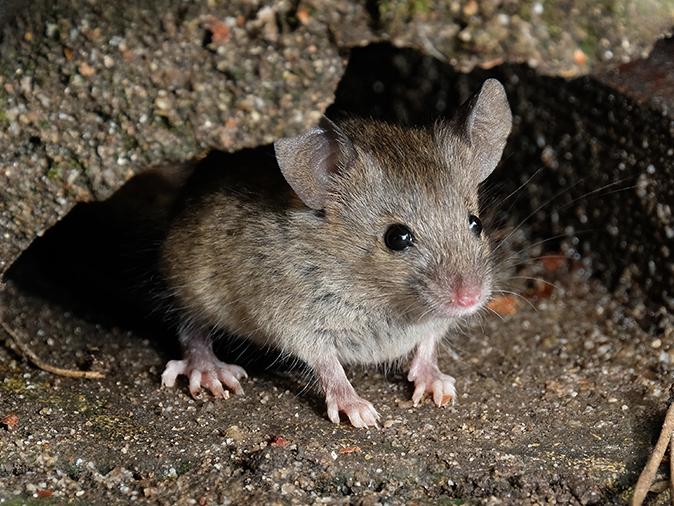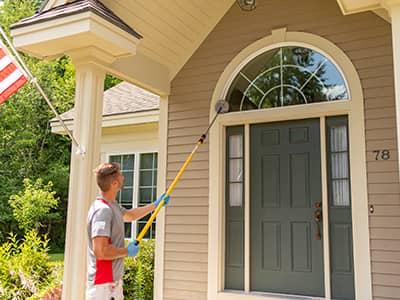October 22, 2024
As a child, you probably remember watching Cinderella and thinking how great it would be to have a bunch of mice as cute as Jaq and Gus running around your home. The reality of a mouse infestation is, unfortunately, nothing like the movies and could be a source of danger to your family and your home. In this blog post, we’ll take a closer look at these small rodents and how to keep them out of your home and away from your family!

When are mice a problem in Maine?
Mice are a year-round problem in Auburn, Portland, and throughout Maine. However, fall is when home and camp owners may notice a spike in activity. As temperatures drop and we start grabbing our pumpkin spice coffees from Dunkin', mice seek shelter from the cold. They’ll exploit any tiny gap or crack in your home’s exterior to get indoors, creating a cozy space to settle for the winter.
Do mice breed inside the house?
Oh yes, mice are prolific breeders! In fact, a single mouse can have multiple litters per year, with up to 35 babies annually. So, if you spot a mouse, you’re probably not dealing with just one, and the population can multiply quickly. Moreover, mice reproduce all year round; it doesn’t matter whether they’re out in the wild or set up inside structures.
Health risks associated with mice
Mice may be small, but they pose significant risks to your health and home. Here’s how:
Mouse allergens
Mouse droppings, urine, and dander can trigger allergy-like symptoms and even cause asthma flare-ups. These allergens can affect anyone, especially those with respiratory issues.
Diseases transmitted by rodents
Mice are known carriers of diseases that can be spread through direct contact or contaminated food. Some of these include:
- Salmonella (foodborne illness)
- Leptospirosis (a bacterial infection causing flu-like symptoms)
- Hantavirus Pulmonary Syndrome (a severe respiratory disease)
- Lymphocytic choriomeningitis (causing fever, nausea, and muscle aches)
Damages caused by mice
Mice may be small rodents, but the damage they cause can be pretty significant. These rodents have constantly growing front teeth, which means they chew all the time and on anything they can find to keep them in check. This often leads to gnawing on electrical wires in homes, which can create serious fire hazards. Mice also damage insulation, chew through wooden beams and drywall, and ruin personal belongings stored in attics, basements, or garages. Their constant nibbling can destroy items like cardboard boxes, clothing, and even holiday decorations.
Beyond the structural damage, mice contaminate surfaces, food, and stored goods with their droppings and urine, posing both health risks and costly cleanup for homeowners.
Mouse nesting sites inside Maine homes
Mice are incredibly resourceful and will use just about anything to build their nests. Inside homes, they often nest in attics, basements, closets, or behind walls. They’ll tear apart insulation, chew through cardboard boxes, or use bits of fabric and paper to create a warm, cozy nest.
In garages, you might find nests tucked away in stored items like holiday decorations, cardboard boxes, piles of newspapers, or old furniture. Pay close attention to any piles of debris and dark, undisturbed areas where mice are less likely to be noticed.
How to tell if mice are in your home
Mice aren’t always easy to spot, but here are some signs that might point to an infestation:
- Droppings: Mouse droppings are one of the most common signs of an infestation. These small, rice-shaped droppings are typically found near food sources, along baseboards, inside cabinets, or in areas where they nest.
- Nocturnal noises: Scratching or scurrying sounds in the walls or ceilings indicate that mice may have moved in.
- Chew marks: Mice have constantly growing teeth, so they must chew on everything from wires to cardboard. Look for gnaw marks around your home.
- Nests: Mice build nests using insulation, paper, or fabric. Their nests look messy and are often found in hidden corners, attics, or basements.
Another way to tell if your home has a mouse problem is if your pet starts acting strange. Both dogs and cats may act oddly if they detect mice, including fixating on a particular area or sniffing around unusual spots.
What to do if you already have a mouse problem
If you’ve seen a mouse, heard them at night, or found droppings, it’s time to act. Contact Pine State Pest Solutions! Our team offers stand-alone rodent control services, but for the best protection for Maine homes, we recommend ongoing pest control plans starting at just $35/month.
Our Home Protection Plans target house mice, deer mice, Norway rats, and other house-infesting pests. Get ahead of the infestation and protect your home year-round!
Home Protection Plan
Starting as low as $35/month*

Pine State’s Home Protection is an affordable pest control plan that is ideal for homeowners who want general pest control services that target common house-infesting insects and rodents.
When you sign up for this ongoing service, you’ll receive an initial service visit to treat the existing pest problem and then seasonal service visits spread out over the year to ensure pests stay out. That’s a total of four services annually.
Pests covered under Pine State’s Home Protection plan include carpenter ants, cornfield ants, crazy ants, field ants, little black ants, pavement ants, carpet beetles, cigarette beetles, drugstore beetles, flour beetles, ground beetles, hide beetles, larder beetles, saw-toothed grain beetles, warehouse beetles, boxelder bugs, carpenter bees, centipedes, clover mites, American cockroaches, brown-banded cockroaches, wood cockroaches, field crickets, house crickets, European earwigs, firebrats, bald-faced hornets, European hornets, deer mice, house mice, millipedes, Angoumois grain moths, drain moths, Indian meal moths, Mediterranean flour moths, mud daubers, Norway rats, paper wasps, pill bugs, rice weevils, silverfish, sow bugs, springtails, cellar spiders, daddy longlegs spiders, house spiders, jumping spiders, sac spiders, wolf spiders, Western conifer seed bugs, and yellow jackets.
*Some exclusions apply- please see your agreement
This blog post was originally published on August 23, 2021, and has been updated to reflect the most up-to-date information about mice in Maine.

 Subscribe
Subscribe